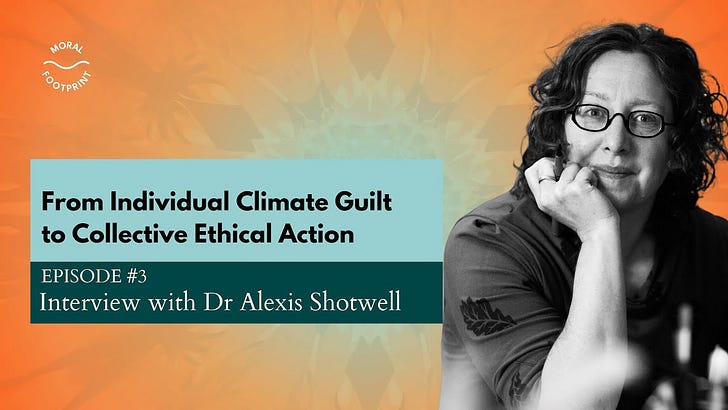From Individual Climate Guilt to Collective Action
A podcast conversation with 'Against Purity' author Dr Alexis Shotwell
In my recent conversation with professor Dr Alexis Shotwell and author of Against Purity, we explored how to live ethically in a world where harm seems unavoidable. Here are the key insights from our discussion:
The Trap of Individual Responsibility
The concept of a “carbon footprint" was created by petroleum company BP in partnership with public relations firm Ogilvy & Mather to shift attention away from corporate and military emissions towards personal consumption. This framework is designed to make us feel overwhelmed and ineffective—attempting to solve systemic problems through individual actions.
When faced with this reality, many of us either:
Strive for impossible purity through rigid rules and self-criticism
Give up entirely with what Shotwell calls "the f*ck-it reaction"
Neither serves us. Shotwell suggests accepting our complicity while recognising the genuine power in intentional choices.
Everyday Choices as Practice
Drawing from her Buddhist background, Shotwell views daily living as a form of ceremony:
"Who we are and how we are is part of a practice of becoming the kinds of beings who can transform the world."
This "existential resilience" fluctuates with our circumstances. Ethical living isn't about perfect consistency regardless of context—it's about doing what we can with what we have, where we are.
Building Collectivity
Shotwell points out: "It's a lie that anyone is an individual, it's a lie that anyone can solve things personally, but we can take things personally and do things together."
Collective action is challenging in our current moment because "people's capacity to work in horizontal, autonomous ways has been massively de-skilled." There’s a real, urgent need for people to upskill and learn how to build effective collectives.
Finding Your Connection Point
Start not with the most important global issue, but with where you already have connections:
"The place to start for collectivity is not with 'what's the most important thing anyone should be working on?' It's to start with, where do you have a connection?"
Shame as Catalyst
Shotwell distinguishes between guilt and shame:
"The feeling about being implicated in horror is more shame—a feeling of 'I don't want to be this person.'"
Unlike shame about our bodies or desires, this ethical shame can be productive—not as an endpoint, but as fuel for commitment to creating a different world.
Small Resistances Matter
Transformation begins with small acts:
"We actually need to practice resisting evil. We're not going to fundamentally transform racist immigration policy if we're too terrified to tell someone that thing they said at work is racist."
These everyday moments build our capacity for larger actions: "We don't solve anything by ourselves, but nothing happens if we don't do things."
By embracing what Shotwell calls "an imperfectionist ethic," we free ourselves from the paralysis of trying to be morally pure. Instead, we can focus on building connections, practicing small resistances, and finding moments to act collectively—becoming "treasonous to the things that we oppose."
Resources & people mentioned
Against Purity by Alexis Shotwell
Alexis Shotwell is writing a book with Killian Yorg called 'An Ecology of Morals’. Read a recent joint article about Moralizing on The Conversation
Jo Walton, friend and science-fiction writer who says that science fiction is not helping us practice for the future that will come. It's helping us practice to be surprised by the future, to generate a future that was not predicted by the current situation.
Alan Sears, a sociologist who talks about the neoliberal deskilling of collectivity (The Next New Left)
Wages for Housework by Emily Kallaci
Claudia Card - philosopher whose work suggests we’re implicated in evil when the actions that are taking place are going to definitely cause unbearable harm.
If you enjoyed this reflection on my conversation with Dr Alexis Shotwell, you can listen to our full discussion on the Moral Footprint podcast on all major platforms. For more information about Alexis’s work, visit her website.




Loved this episode!